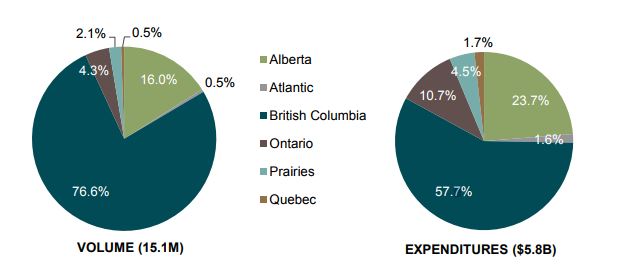B.C.’s tourism industry is keeping an eye on the province’s pipeline dispute with Alberta, as it escalates into what appears to be full-blown trade war territory.

Alberta Premier Rachel Notley said Tuesday that her province’s government liquor importer, the Alberta Gaming and Liquor Commission, would turn off the tap for B.C. wines.
In the wake of B.C.’s proposal to ban increases in diluted bitumen exports through the province, others on social media have taken the boycott threat further, suggesting they’ll pull their tourism dollars, too.
Those threats have B.C.’s tourism operators keeping a close eye on the unfolding situation.
“No organization, business or destination wants to be on the wrong side of a boycott,” said Walt Judas, CEO of the Tourism Industry Association of BC (TIABC).

Get breaking National news
In the case of threats from Alberta, the potential risk to B.C.’s industry is no laughing matter.

According to 2015 statistics from Destination BC, Albertans accounted for nearly $1.4 billion of $9.9 billion in total tourism spending that year.
Alberta spending represented nearly one in four Canadian tourism dollars spent in the province, and more than 13 per cent of all tourism spending in B.C. that year.
Albertans comprised the largest block of out of province Canadian tourists, and behind only British Columbians themselves and visitors from the United States in overall spending.
Despite the potential financial impacts, Judas said the association’s members aren’t ready to panic yet. He said there’s a big gap between making a threat on social media and following through.
“Is it five per cent of people with plans to travel to British Columbia, is it 25 per cent? It’s hard to say,” he said.
“Many, many Albertans have friends and family in our province, many have second homes or favourite vacation spots, so the premier’s call to boycott B.C. could have a significant impact on Albertans themselves.”
Judas said a tourism boycott of B.C. could also backfire on Alberta, if British Columbians retaliated by refusing to visit popular destinations in the neighbouring province.
British Columbians account for the largest non-Albertan block of tourists in that province, racking up more than one million (or eight per cent of) overnight visits in 2015, according to Tourism Alberta.
Nonetheless, Judas said the growing dispute is one the industry takes seriously, and that operators want to see the two province’s premiers get serious about resolving the issue in a civil manner.
In the meantime, he said B.C. tourism destinations are keeping the doors wide open to Alberta guests.
“We certainly value and appreciate them as visitors to our province, we’ll continue to provide the hospitality and the services and the experiences that they’ve come to expect and appreciate, and likewise we would see people from British Columbia doing the same if they visit Alberta,” he said.
“It really is not helpful to boycott a particular jurisdiction.”













Comments